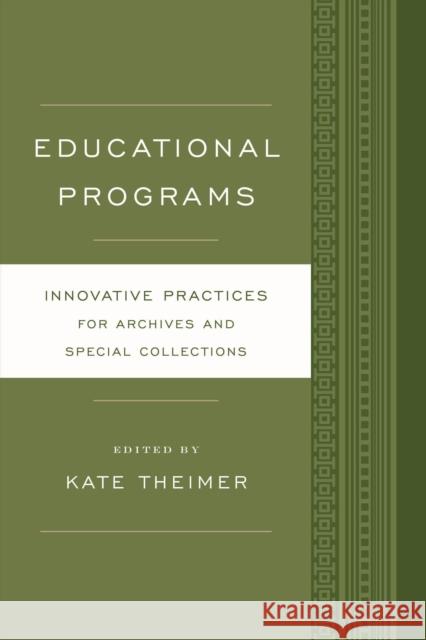Educational Programs: Innovative Practices for Archives and Special Collections » książka
Educational Programs: Innovative Practices for Archives and Special Collections
ISBN-13: 9781442238527 / Angielski / Miękka / 2015 / 208 str.
Educational Programs: Innovative Practices for Archives and Special Collections
ISBN-13: 9781442238527 / Angielski / Miękka / 2015 / 208 str.
(netto: 301,29 VAT: 5%)
Najniższa cena z 30 dni: 299,95
ok. 22 dni roboczych.
Darmowa dostawa!
Educational Programs: Innovative Practices for Archives and Special Collections explores how archivists and special collections librarians in organizations of different sizes and types have approached the challenges in creating effective educational programs to prepare the next generation of researchers and advocates for archives. The case studies featured are: 1.Tablet and Codex, Side by Side: Pairing Rare Books and E-Books in the Special Collections Classroom 2.Fells, Fans and Fame: Acquiring a Collection of Personal Papers with the Goal of Engaging Primary School Children 3.Student Curators in the Archives: Class-Curated Exhibits in Academic Special Collections 4.A Win for All: Cultural Organizations Working With Colleges of Education 5.The Archive as Theory and Reality: Engaging with Students in Cultural and Critical Studies 6.Make Way for Learning: Using Literary Papers to Engage Elementary School Students 7.Archivists Teaching Teachers: The Archives Education Institute and K-12 Outreach 8.Animating Archives: Embedding Archival Materials (and Archivists) into Digital History Projects 9. A Certain Kind of Seduction: Integrating Archival Research into a First-Year Writing Curriculum 10.Not Just for Students: An Archives Workshop for Faculty 11.Web Archiving as Gateway: Teaching K-12 Students about Archival Concepts 12.Evocative Objects: Inspiring Art Students with Archives 13.Documenting and Sharing Instruction Practices: The story of TeachArchives.org These case studies show a range of audiences and strategies, but all were selected because they demonstrate ideas that could be transferred into many other settings. They can serve as models, sources of inspiration, or starting points for new discussions. This volume will be useful to those working in archives and special collections as well as other cultural heritage organizations, and provides ideas ranging from those that require long-term planning and coordination to ones that could be more quickly implemented. The chapters also provide students and educators in archives, library, and public history graduate programs a resource for understanding the varieties of issues related to creating and implementing educational programs and how they can be addressed."











